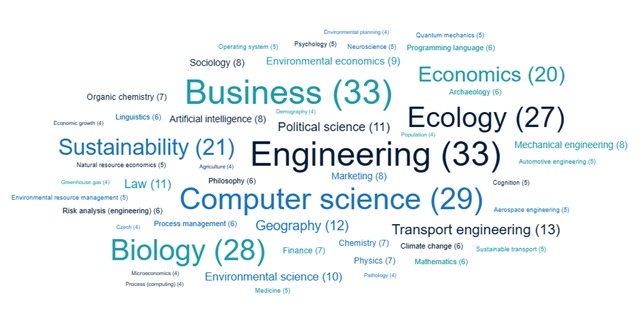Exploring the Field of Cognitive Sustainability
Main Article Content
Abstract
Cognitive Sustainability (CogSust) investigates the links between two research areas: sustainability and cognitive sciences. Sustainability can be viewed as an environmental discipline primarily, but it extends beyond this to encompass an engineering challenge and spans several other disciplines. The main aim of CogSust is to provide a holistic view of how sustainability in a broader aspect can be understood, described (modelled), and optimised for human value creation using the tools of the cognitive sciences. It results in a deeper merge of artificial and biological cognitive systems with engineering applications. This paper aims to show the development of the research field and the journal.
Article Details

This work is licensed under a Creative Commons Attribution-NonCommercial-ShareAlike 4.0 International License.
Authors retain copyright and grant the journal right of first publication with the work simultaneously licensed under a Creative Commons Attribution License that allows others to share the work with an acknowledgement of the work's authorship and initial publication in this journal.
Authors are able to enter into separate, additional contractual arrangements for the non-exclusive distribution of the journal's published version of the work (e.g., post it to an institutional repository or publish it in a book), with an acknowledgement of its initial publication in this journal.
Authors are permitted and encouraged to post their work online (e.g., in institutional repositories or on their website) prior to and during the submission process, as it can lead to productive exchanges, as well as earlier and greater citation of published work (See The Effect of Open Access). As soon as the paper is accepted, finally submitted and edited, the paper will appear in the "OnlineFirst" page of the journal, thus from this point no other internet-based publication is necessary.
References
Becsi, A., Varga, M., Loga, M., Kolozsi, P. P. (2022). First steps – the nascent green bond ecosystem in Hungary. Cognitive Sustainability. 1(1). DOI: 10.55343/cogsust.11
Coupé, T., Reed, W. R., Zimmermann, C. (2023). Getting seen: Results from an online experiment to draw more attention to replications. Research Policy. 52(8), 104841. DOI: 10.1016/j.respol.2023.104841
da Silva, J. A. T., Dobránszki, J. (2019). Preprint policies among 14 academic publishers. The Journal of Academic Librarianship. 45(2), 162–170. DOI: 10.1016/j.acalib.2019.02.009
Lavik, G. A. V., Sivertsen, G. (2017). ERIH PLUS–Making the SSH visible, searchable and available. Procedia Computer Science. 106, 61–65. DOI: 10.1016/j.procs.2017.03.035
Martín-Martín, A., Orduna-Malea, E., Thelwall, M., López-Cózar, E. D. (2018). Google Scholar, Web of Science, and Scopus: A systematic comparison of citations in 252 subject categories. Journal of Informetrics, 12(4), 1160–1177. DOI: 10.1016/j.joi.2018.09.002
Virt, M., Arnold, U. (2022). Effects of oxymethylene ether in a commercial diesel engine. Cognitive Sustainability. 1(3). DOI: 10.55343/cogsust.20
Zoldy, M., Szalmane Csete, M., Kolozsi, P. P., Bordas, P., Torok, A. (2022). Cognitive sustainability. Cognitive Sustainability. 1(1). DOI: 10.55343/cogsust.7





